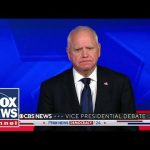**Kamala Harris and the Green New Deal: A Democratic Dilemma**
In the ever-turbulent world of American politics, one topic rains down like a storm cloud over party lines: the Green New Deal, particularly when supported by Kamala Harris. Just imagine the political scene—a vibrant battleground where everyone is trying to throw the opposition off their game. Recently, a representative from the Democratic camp, Governor Jared Polis of Colorado, found himself in the hot seat, defending Harris’s support of this multi-trillion dollar proposal.
The Green New Deal, co-sponsored by Harris and Bernie Sanders in the Senate, is not just your average political pamphlet; it’s a sprawling proposal advocating for sweeping changes to combat climate change. Proponents tout it as a cradle-to-grave solution, envisioning a world where the government covers everything—from healthcare to housing. Sounds nice, right? But Governor Polis had quite a challenge ahead, sitting across from a seasoned conservative host ready to debunk the details of this ambitious plan.
Polis expressed a love for Colorado, perhaps the only calm moment in a discussion that felt more like a sporting event than a political interview. The host, believing that this Green New Deal is more acidic than refreshing, hinted that there were some serious questions on the table. Would Harris’s endorsement of such a colossal change be beneficial for America, or would it end up burying the economy under a mountain of debt and responsibility? The question hung in the air like an unwanted guest at a party, uninvited yet refusing to leave.
As the back-and-forth ensued, Polis tried to make sense of what some critics saw as a maze of contradictory statements from Harris. When asked about whether she still supports the elimination of private health insurance, Polis leaned on the defense that she never intended to outright abolish it. He argued that Harris was more focused on expanding healthcare options rather than taking away personal freedoms—a maneuver that sounded comforting but perhaps lacked the bite that taxpayers needed to hear. The clock was ticking down to Election Day, and the Republicans were ready to pounce on any inconsistency.
The conversation then shifted gears toward immigration, with Harris’s platform including many eye-catching promises like decriminalizing illegal immigration and providing educational and healthcare benefits. For conservatives, that resonates like nails on a chalkboard. Polis sought to assure the interviewer that securing the border was first and foremost, despite a good chunk of Harris’s policy positions seeming to suggest otherwise. The political debate heated up, and Polis began to dig himself deeper into murky waters, aiming for bipartisanship while facing tough questions about the consequences of such policies on American sovereignty.
Finally, the host set the stage for what could be a vow of friendship, teasing Polis for his welcoming attitude toward former New Yorkers like himself. The debate ended without any clear resolutions, illustrating the chaotic nature of American politics. In the end, it wasn’t merely about Harris’s policies; it symbolized the larger struggle among American voters grappling with contrasting visions of the future—one of liberty and individual rights or one of extensive government oversight and involvement.
As the interview concluded, it left viewers feeling thoughtful, or perhaps even bewildered, by the cacophony of opinions. The political landscape remained unchanged, though opponents now had fresh fuel for future debates. Will Harris and her Green New Deal remain a celebrated vision among Democrats or be viewed as a sinking ship in the stormy sea of electoral politics? Only time will tell, and that’s the thrill of it all!




